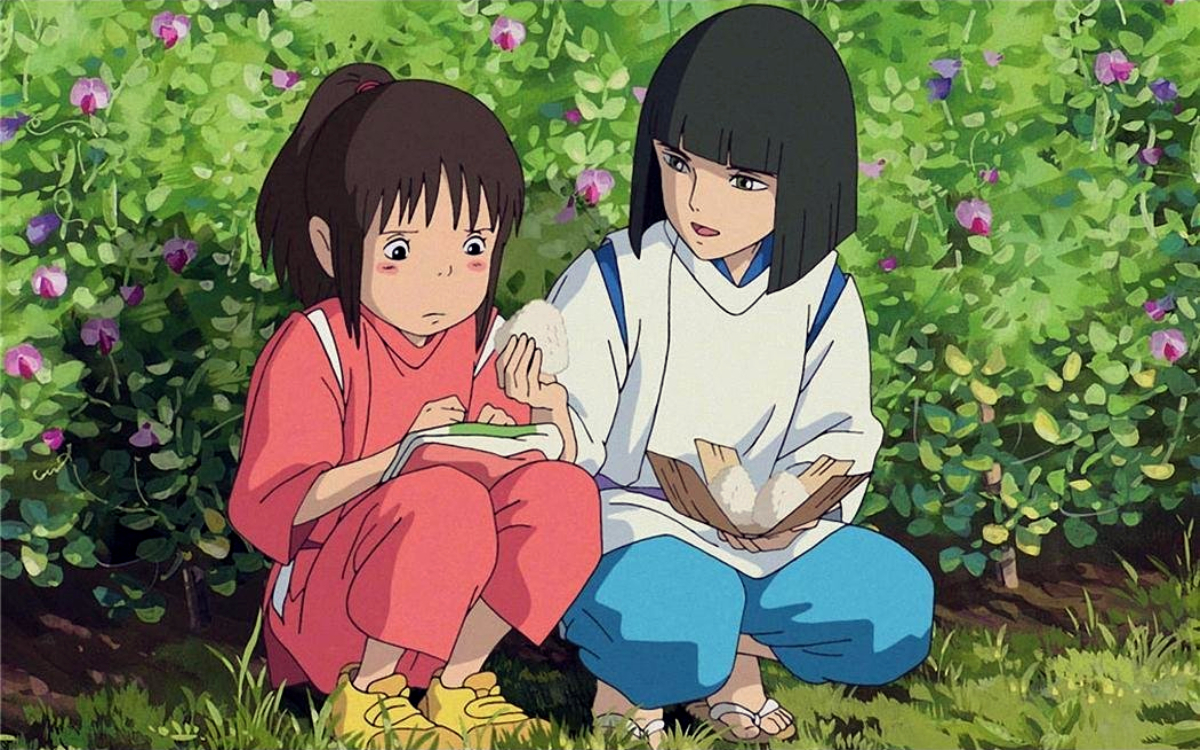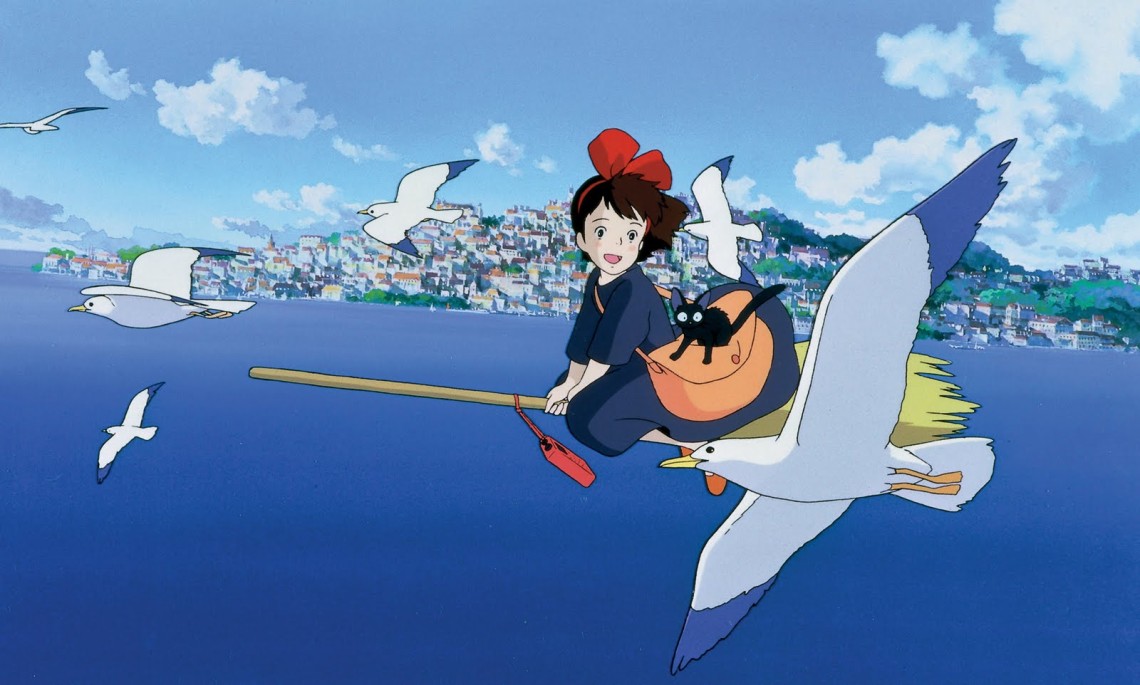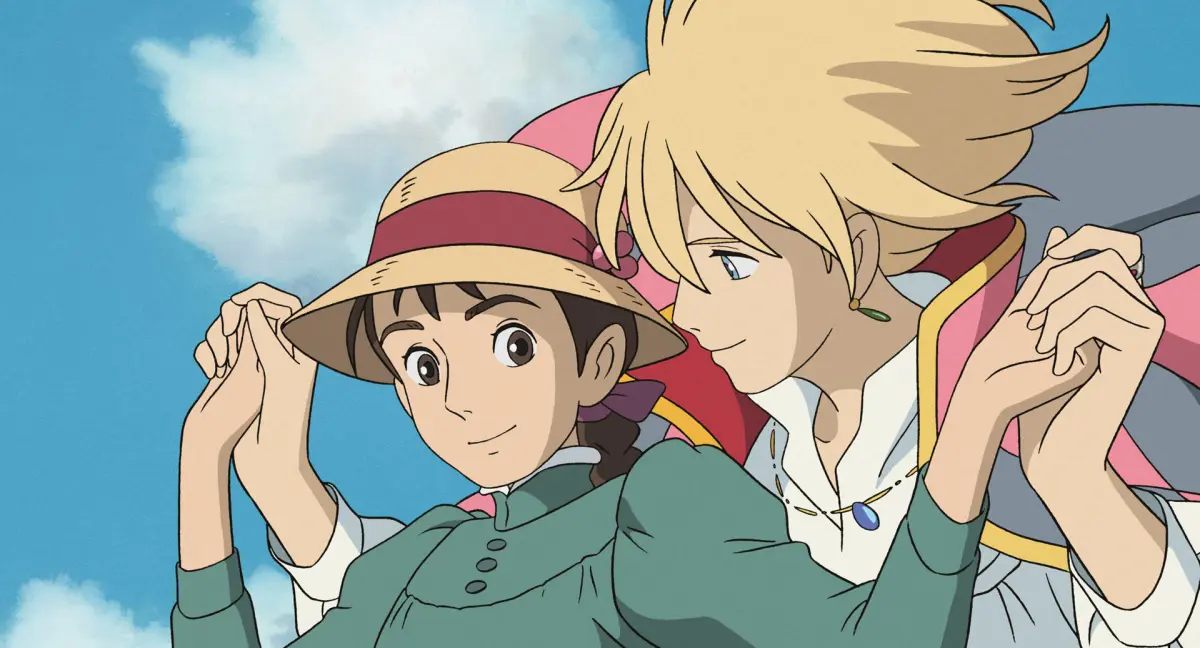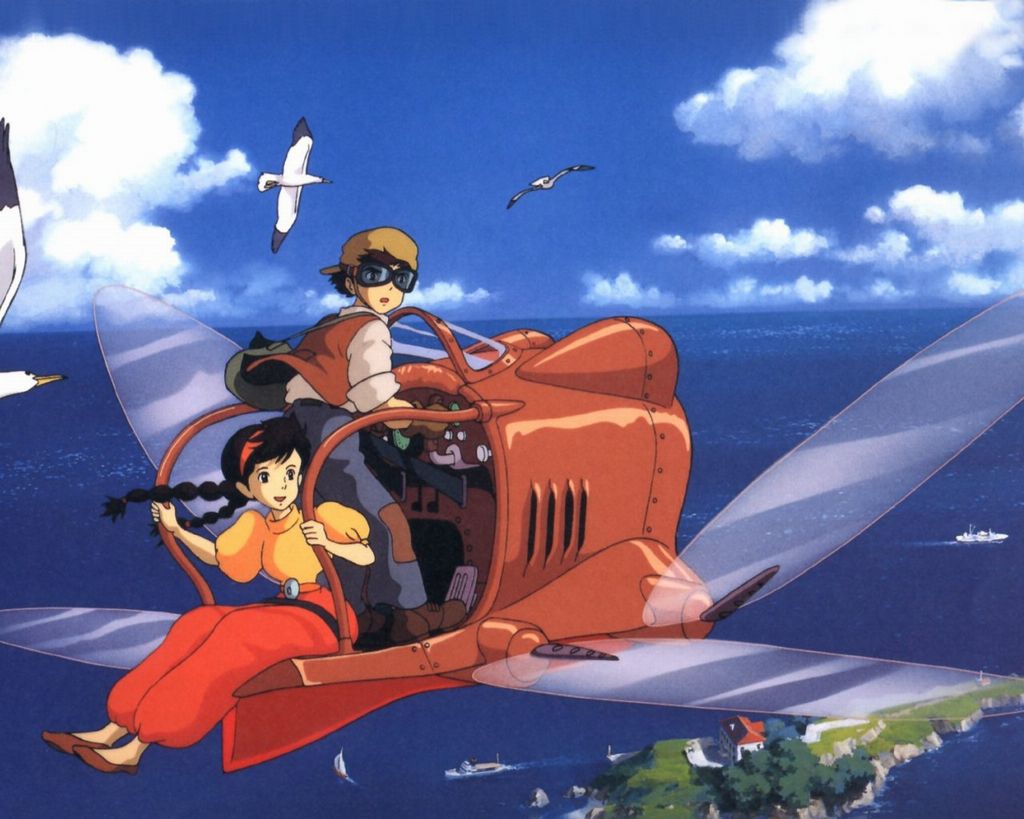

Magical is a word used casually about films like this, films about fantasy and childhood. Yet this one really does deserve it: an enchanted and enchanting feature from the Japanese animator Hayao Miyazaki which left me feeling lighter than air. It is a beautifully drawn and wonderfully composed work of art - really, no other description will do - which takes us on a rocket-fuelled flight of fancy, with tenderly and shrewdly conceived characters on board.

Before this movie, I was agnostic about Miyazaki and his world-renowned Ghibli studio; I couldn't join in the mass hollering of superlatives that greeted the release of his Princess Mononoke last year. That was striking and distinctive, but I found the kaleidoscope of visual images oddly depthless and psychologically uninvolving and the Japanimated moppet faces an acquired taste. Even now, my euphoria after seeing Spirited Away is soured a smidgen by reading comments by some of its more supercilious cheerleaders, who affect to adore it at the expense of "America" and "Disney": thus fatuously denigrating a great animation tradition to which Miyazaki is patently, and honourably indebted.
Release date: August 31, 2002 (USA)
Director: Hayao Miyazaki
Music by: Joe Hisaishi
Distributed by: Walt Disney Pictures, Toho Co., Ltd., StudioCanal UK
Awards:58 wins
Budget: 1.9 billion yen (US $12 million)
Box office: $396 million
There is just so much going on in this story that it's impossible to sum up. But it had me utterly involved from the very start, and that's down to the mind-bogglingly superb animation that, for me, had a human and psychologically acute element to add to the expected dimension of hallucinatory fantasy. It's this that makes the claim of "masterpiece" so plausible - that, and the wit, playfulness and charm that Miyazaki mixes into the proceedings.
Spirited Away couldn't be more different from, say, Shrek - another masterpiece that Ghibli enthusiasts patronise at their peril - and yet the out-of-this-world visual inventions of Spirited Away have the same gasp-inducing quality, but achieved without its hi-tech sheen and glitz. The scenes of Yubabu's palace complex seen at dusk across water, at sunrise through the mist, or in moonlight or sunlight made me purr with pleasure. And the compositions of Miyazaki's scenes in a bright flower garden are sublime in their forthright, untarnished innocence.
This remarkable film - finally released here two years after it was made - first entranced European audiences at the Berlin film festival. It is available in two versions: the Japanese original with subtitles, or, if you really want, dubbed with American voices. To those who prefer a dubbed version, I can only say that like screwtop wine, it might turn out to be all right. But why compromise the pleasure of this film with an error of taste as silly as that? Spirited Away is fast and funny; it's weird and wonderful. Mostly wonderful.
Alongside his previous film My Neighbor Totoro, this is also the simplest story that Hayao Miyazaki has ever brought to the screen. It starts off fittingly with the young trainee witch Kiki leaving her home for the first time, together with her cat Jiji. Much like My Neighbor Totoro, Kiki's Delivery Service keeps everything very straightforward as it shows the young Kiki finally trying to adjust to a new life away from home, but as Miyazaki shows you this perspective from the young Kiki it also becomes one of his most heartwarming efforts to date. It's heartwarming because the thought of a witch coming to live among us could only seem so out of this world, but also because she lives an experience that would be familiar to all of us in some way or another.

In Kiki, Miyazaki creates one of his most endearing and relatable protagonists. In many daily functions that make the city life so ordinary to us, Miyazaki shows them to be something completely new, especially to a witch unfamiliar with how the world around her works. As she starts coming of age, we get a better sense of the sort of person that she wants to become, as well as the many relationships that she has formed in order to make her the person that she is. Throughout the film, she lives an experience that is familiar to us in some way or another, from moving into a new place, finding a job, feeling insecure about ourselves, and adjusting to a life all on her own, and it's these ordinary moments that keep Kiki's Delivery Service ever so vibrant.
Release date: January 1, 1989 (USA)
Director: Hayao Miyazaki
Music by: Joe Hisaishi
Distributed by: Toei Company, Walt Disney Studios Motion Pictures, Walt Disney Studios Home Entertainment
Budget: 800 million yen (US $5 million)
Box office: $41.8 million
Viewing Kiki's Delivery Service as a kid, it's hard not to be charmed by how vast the world that Miyazaki portrays Kiki's new home. In what appears to be his most ordinary-looking film, just the thought of it being room for a new experience is what makes Kiki's Delivery Service feel every bit as magical as it is. But it's also a great testament to Hayao Miyazaki's skill as a storyteller when you also take into account his talent for bringing magical realism to the screen. All of the most fantastical elements in Kiki's Delivery Service feel like reflections of real world experiences that will stick with children all the more, but as one grows older these moments feel almost like reflections of what we could be feeling at some point of our life, especially as we grow to take on more responsibilities that never crossed our mind during the peak of our youth.
When talking about what this film speaks for its adult audiences, Kiki's experiences resonate more as we slowly get overwhelmed by the world around us. There's always a set expectation from people we know as we grow older, that at a certain point we should have an idea about what it is that keeps us motivated into doing what we love most. Despite being Miyazaki's most playful film at heart it also carries a very melancholy shadow, especially when it comes to how it portrays the sort of burden we place over ourselves based on expectations set by people around us. Even as Kiki finds something she loves doing, she still knows she isn't perfect at it either, yet it's always lovely to see how she tries to make everyone around her happy whilst finding her own identity along the way.
Hayao Miyazaki obviously has a strong liking for steampunk films, as shown by Castle in The Sky, and fantasy stories, as can be seen with his films My Neighbor Totoro and Spirited Away.
Well, with his 2004 anime Howl's Moving Castle, he merges these two genres to create an interesting tale about a young woman named Sophie (Chieko Baisho) who, while living in a steampunk world, is cursed to look like an old woman by the Witch of the Waste (Akihiro Miwa) after encountering the mysterious wizard, Howl (Takuya Kimura). Searching for a cure, she is reunited with Howl, his apprentice Markl (Ryunosuke Kamiki), a demon named Calcifer (Tatsuya Gashuin), and a living scarecrow, and goes on numerous adventures with them in Howl's titular moving castle.

The animation that shows off these various technologies and magic spells is incredibly well done, as I was in awe at the first shot of Howl's Castle. Along with this, the characters are also likeable, although I will say that the romance between Sophie and Howl does not exactly feel right.The setup for it is there with their first meeting but their following interactions never really gave me the feeling that they were falling in love.Despite not really getting a romantic vibe though, I still did like Sophie and Howl's interactions, along with a lot of the other character interactions, especially Sophie's conversations with the silent, living scarecrow.
Release date: June 17, 2005 (USA)
Director: Hayao Miyazaki
Music by: Joe Hisaishi
Distributed by: Walt Disney Pictures, Toho Co., Ltd., Walt Disney Studios Home Entertainment, StudioCanal UK
Budget: 2.4 billion yen (US $15 million)
Box office: $236 million
However, I will say that the way the scarecrows story ended felt extremely abrupt. And this is really my big problem with Howl's Moving Castle, the third act. Many of the plot points in this act left me thoroughly confused. For example, as I said, the inciting incident of the film is Sophie being turned into an old woman. But, she seems to change between old and young across the film and this is strangely never addressed by the other characters or the plot.
By the end, I assumed it had something to do with love, or night, or a combination of the two but I don't really know. Not only this but the direction the story goes gets really confusing as well with, of all things, time travel being introduced and it is never explained how that happens.
Howl's Moving Castle also has a villain problem, what with the main threat being setup as the Witch of the Waste, before this is undermined and a seemingly new villain takes the stage, only for this new villain to be absent for the rest of the film. From the midpoint to the end, the film slowly devolves to the point that I was dissatisfied with the ending.
This is not to say I disliked Howl's Moving Castle, on the contrary I still think it is a very well done film what with the way it begins, the brilliant way it mixes steampunk with fantasy, and the animation. But, the plot slowly begins to unravel as the film goes on, until it gets genuinely confusing to the point that I thought the story could have been handled better. I would still recommend Howl's Moving Castle though because of its numerous good qualities.
The first film to be released under the Studio Ghibli name, Castle in the Sky may be among Hayao Miyazaki's more straightforward films but that never takes away from how thoroughly exciting it is from beginning to end. Much like Spirited Away and Kiki's Delivery Service, Castle in the Sky was a film that had been a favourite of mine when I was very young but it was also one that I never came back to until just recently. As I watch the film again as an adult, Castle in the Sky doesn't only hit me again with that same magic like it did as a kid but I'm still in awe at how perfectly constructed it is - which is just about everything I could ever want from any of Miyazaki's films.

Opting for a much less dense plot compared to Nausicaä of the Valley of the Wind, Castle in the Sky starts with a very fitting note: a young girl named Sheeta has been abducted by the agent Muska as his airship is being attacked by Dola's air pirate gang. Setting the tone for the adventure is the image of Sheeta as she falls from the airship, with a descent slowed down by her magical pendant landing into the company of Pazu, a young boy living in a small mining town. Together, Pazu and Sheeta embark on a search for Laputa (referencing Jonathan Swift's Gulliver's Travels), a legendary floating island in the sky. Despite opting for more straightforward storytelling, Miyazaki never lets down on the excitement to come by, making Castle in the Sky more than just one of the best animated films of all time.
Release date: July 19, 1991 (USA)
Director: Hayao Miyazaki
Music by: Joe Hisaishi
Distributed by: Toei Company, Best Hollywood Ltd.
Budget: 500 million yen(US $3 million)
Box office: $157 million (2021)
Being the classic “good vs. bad” adventure tale, Miyazaki never lets down on the excitement as Castle in the Sky lends itself well to being his fastest moving film. Together with the perfectly constructed world building as well as Miyazaki's environmentalist subtext, what Castle in the Sky brings out in Studio Ghibli's long body of work is also the perfect picture of child's desire for adventure, yet also a perfect commentary on the means in which technology can coexist together with nature. The world of Laputa represents a perfect utopia for Hayao Miyazaki, being a distorted portrait of the industrial revolution - being a source of unmistakable power and wealth. Of course, the thought runs that all this could end up in the wrong hands, which sets the stakes so perfectly high up yet racks up all the sense of excitement you could ever feel from exploring the vast and beautiful world of Laputa and its history.
To call Castle in the Sky one of the best animated films wouldn't be enough to capture everything that makes this film as wonderful as it is. For every minute that Castle in the Sky can get very goofy, it nonetheless boasts some of Miyazaki's most beautifully detailed work to date, but also some of his most thrilling. Putting it lightly, it's Miyazaki at some of his most imaginative - which makes it the perfect adventure tale for kids, but also a perfect ride if you're to look at the film as an adult. For all I know, this was a film that I've long stuck with since I was very young and to look at it again now just feels like I'm being brought back to the happiest of my own childhood memories. Castle in the Sky truly is an enchanting adventure, one that only became a catalyst for what was to come in the future for Studio Ghibli.